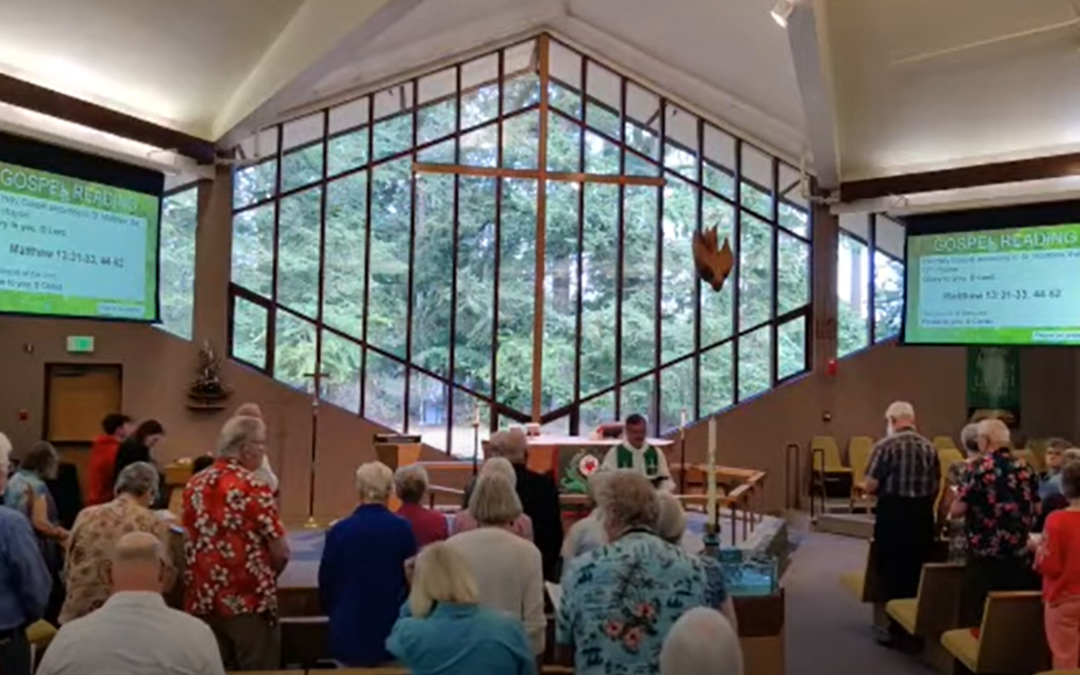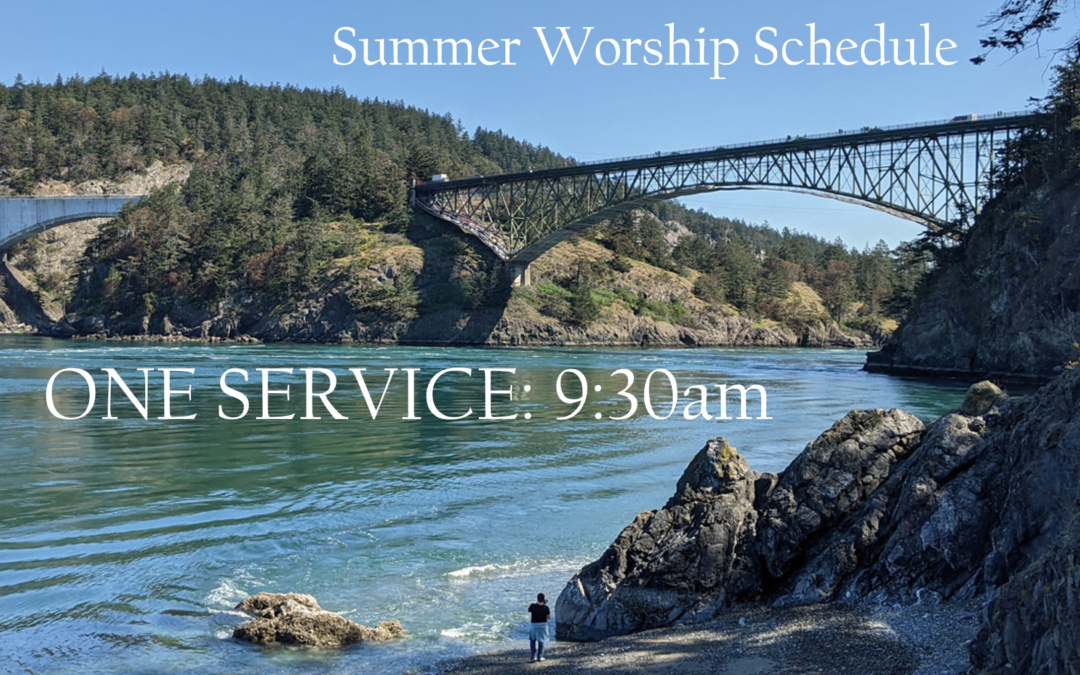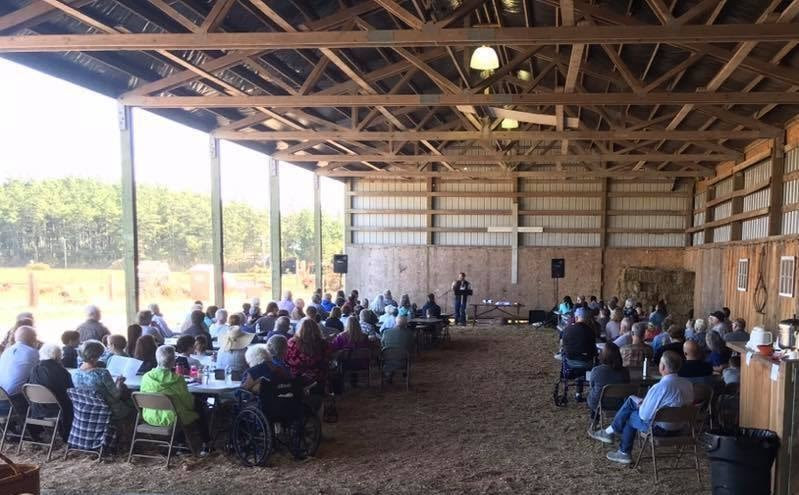
Back to two services!
We have resumed our regular worship schedule of two services, at 8:00 a.m. and 10:30 a.m. We’d love to have you join us for worship!

We have resumed our regular worship schedule of two services, at 8:00 a.m. and 10:30 a.m. We’d love to have you join us for worship!

Sunday school for all ages is held from 9:15 – 10:15. Children and youth are in our education wing, while the adults gather in the church library. Come grow in your faith! All are weclome!
CLICK HERE for a worship video for August 27
Sermon for the Thirteenth Sunday after Pentecost – August 27, 2023
Matthew 16:13-20
This sermon was delivered at Three Sisters Farm for our annual worship service in the barn and church picnic and reflects that setting.
Dear friends, grace to you and peace from God our Father, and our Lord and savior Jesus Christ.
It should be obvious today, as we meet in a barn, that the church is not a building. When we say we are “going to church,” we do not just mean we are going to a specific place, a specific address. As wonderful and precious to us as our sanctuary is, it does not define what or where the church is. So what does? Where is the church? What is it?
Our gospel reading for today begins with important questions about who Jesus is. “Who do people say that I am?” Jesus asks the disciples. They fill him in on what the buzz is, what people are saying. Some think he is a reincarnated John the Baptist, or Elijah, or Jeremiah. Then Jesus points the question at them: “But who do YOU say that I am?” Peter answered, “You are the Messiah, the Son of the living God.”
Peter nails the answer! He gets it exactly right! Jesus is the Messiah, the Christ, the Savior. He is uniquely the Son of the living God, the God who is active and present and at work. With Peter’s correct answer, the conversation quickly turns to the nature and purpose of the church. In response to Peter’s correct answer, Jesus says, “On this rock I will build my church.” What is this rock, and what is Jesus building?
First of all, the rock on which Jesus is building is not the person of Peter but his confession, his statement of the truth about who Jesus is. Peter the person can be a little rocky. Our gospel reading ends at verse 20, and by the time you get to verse 23 Jesus is calling Peter Satan and tells him to get behind him! So Peter the person isn’t the rock itself. After the resurrection Peter will indeed become a bold and powerful preacher. He will become the first pope, as our Roman Catholic brothers and sisters like to point out. They’re partially right – Peter was the first leader of the Christian church. But Christ’s church is not founded on Peter the person. It is founded on the Word that person spoke. The foundation of the church is the confession, the public testimony, that Jesus is the Messiah and the Son of the living God.
This confession is why the church exists. We exist to confess Christ. The foundational purpose of the church is to know Jesus and to make him known. Yes, we do social service projects. Yes, we help our neighbors in need. Yes, we strive for healthy families and healthy communities and a more just world. But as important and wonderful as all those things are, none of them are the foundation of the church. None of them are the fundamental reason for its existence. As our own presiding bishop, Elizabeth Eaton, has said: “We are the church. We are not a social service agency with sacraments.” As the church we exist to proclaim the truth about who Jesus is, that he is the Messiah and the Son of the living God.
It is also worth noting that Jesus describes the church he is building as his church. “On this rock I will build my church,” he says. The church does not belong to those who have been in it the longest. It does not belong to those who give the most. It does not belong to the pastor. It is Christ’s church.
That’s good news, because if it is Jesus’ church, nothing can destroy it. That’s precisely the promise Jesus makes. “On this rock I will build my church and the gates of Hades will not prevail against it.” “The gates of Hades” is a biblical expression for the power of death. Jesus is saying that his church, just like himself, will never die.
There is much talk about the church dying these days, at least in western civilization. Downward trends which were already in place before the pandemic accelerated rapidly during it and have not quite recovered. There are more and more congregations which have closed or are starting to have painful conversations about needing to. Our own denomination has lost members every single year since it was founded in 1987. We started with about 5 million and are down to about 3 million. This is not a problem unique to the ELCA by any means.
We don’t want to be naive about any of this. We shouldn’t stick our heads in the sand. Individual congregations can and do die. But the church itself will never die. The gates of Hades will not prevail against it. History has shown that the church has faced all kinds of dire challenges before. It has survived through dark ages where almost forgotten manuscripts of Christian texts were curated by devoted monks in caves for hundreds of years. It has survived through the bubonic plague, which killed as much of 60% of the population of Europe. It has survived through scandals and violent infighting and horrible betrayals of its mission and identity.
Individual congregations may close. Entire denominations might find themselves on life support. But Christ’s church will not die. God will preserve it in one form or another. That’s Jesus promise to us!
Because we have this promise, we don’t need to be constantly checking the church’s pulse. Instead, we can keep at the mission we have been given. And Jesus makes it clear in this reading what our mission is. Jesus has given the church the keys to the kingdom of heaven. “On this rock I will build my church, and the gates of Hades will not prevail against it,” Jesus says. “I will give you the keys of the kingdom of heaven.”
This passage is where we get the idea of Peter as the gatekeeper of heaven. It’s where we get all those St. Peter at the pearly gates jokes. But again, this is not about Peter the person. It is about the church and its mission. Those keys are the keys of forgiveness. As Martin Luther said about this passage, “Christ gave his church the authority to forgive the sins of those who repent.” These keys are the keys that unbind people from their sin, setting them free to live a new life. They are the keys that open the gates of heaven not only when we die, but here and now as we are reconciled to God through Jesus Christ, freed for a relationship with the living God which begins now and continues forever.
These keys are not those bits of metal you have hanging off your keychains. They certainly aren’t the keys to the church building. These keys are words. These keys are the proclamation that through Jesus, your sin is forgiven. These keys are the announcement that God’s love for you is bigger than your brokenness. These keys are the testimony that Jesus has come to set you free from your past to live into a new future with him.
These declarations are spoken to us week after week. We need to hear it over and over again because the world, the devil, and our sinful selves have a way of putting those cuffs back on over and over again. We find ourselves repeatedly bound by guilt and shame and fear and despair.
But these declarations are also to be spoken by us. Not just by the pastor on Sunday morning in the designated building at the announced time. These words are to be spoken by all of God’s people to all of those who need to hear it, which is every human being on the face of the earth.
Whenever anyone is given a key, it comes with a measure of trust. If someone gives you their house key, or a car key, or a key to a workplace, there is the expectation that it will be used in the way it is expected to be used. Our Lord Jesus has given us the keys to the kingdom of heaven. Our Lord Jesus has given these keys to you. You have the power, and the responsibility, to use them in ways that set people free, in ways that help people live into the truth that Jesus is the Messiah and the son of the living God.
Maybe that means personal witness or public testimony – always given in a spirit of humility and gentleness, as the scriptures counsel us. Maybe it means putting those words in the ears of your children or other loved ones. Maybe it means inviting a neighbor or a friend to worship so they can hear it there. Maybe it means a careful conversation with someone who is bound up in guilt or shame or despair and needing you to pull out the key that can set them free. These keys have been entrusted to all of us. We all have the power, and the responsibility, to use these keys as our Lord intends.
The church is not just a building located at 1253 NW 2nd Avenue. The church is here too. The church is wherever God’s people have been gathered together to hear his Word. The church is wherever the confession is made that Jesus Christ is the Messiah, the One who saves us, the Son of the living God. The church is wherever the keys are used to unbind troubled consciences and hurting hearts. The church is wherever and whenever Christ’s forgiveness is proclaimed and received and shared.
And so, welcome to church today – yes, even here in a barn. For even here the Lord Jesus is building up the kingdom of heaven in us, and the gates of Hades will not prevail against it.
Thanks be to God. Amen.
Rev. Jeffrey R. Spencer
Oak Harbor Lutheran Church

For the summer months we will come together as one congregation for one service at 9:30am. Please join us!

We will have ONE SERVICE on Sunday, August 27, at 11am. It will be held at Three Sisters Farm (938 Scenic Heights Road, Oak Harbor). Our church picnic will follow. Burgers & hot dogs will be provided. You are invited to bring a side dish, salad, and/or dessert to share. Bring a friend too!